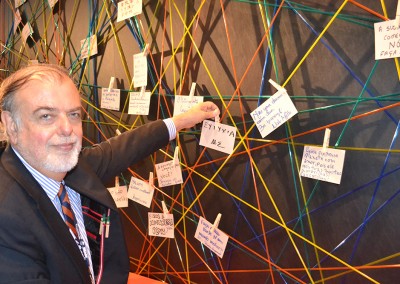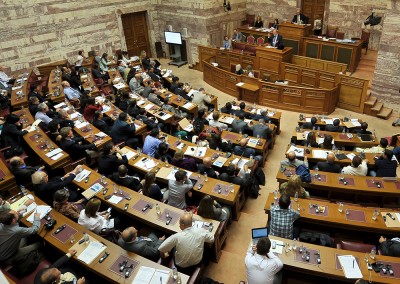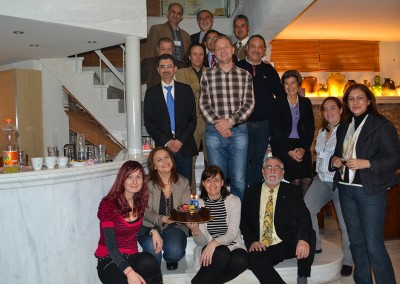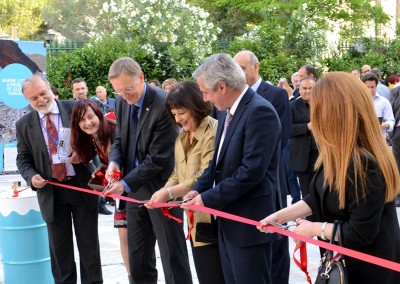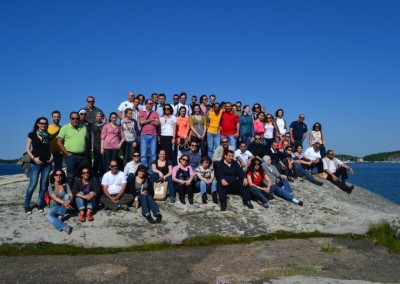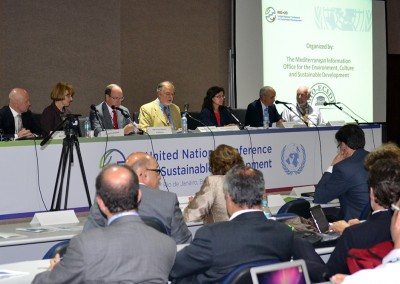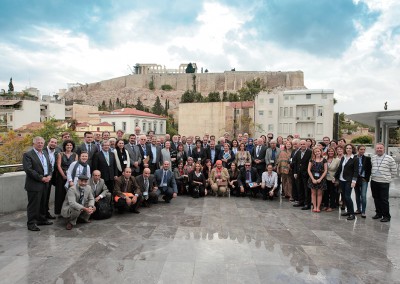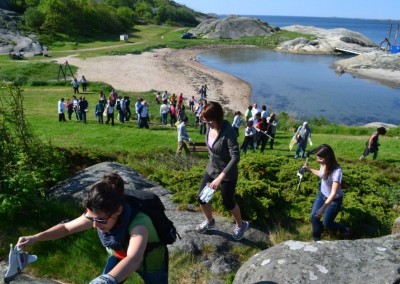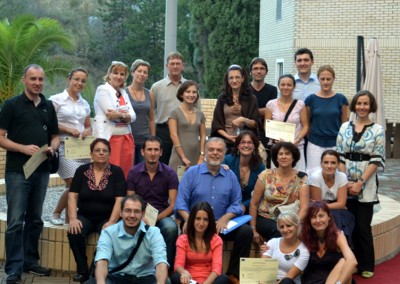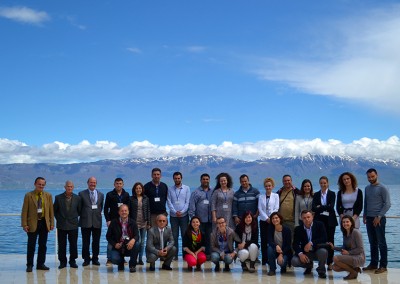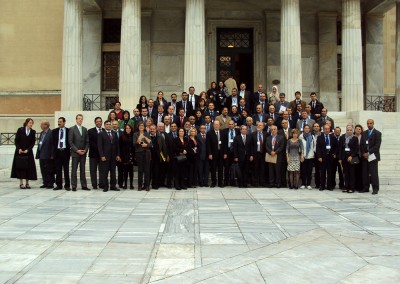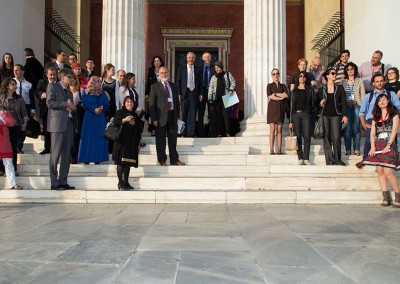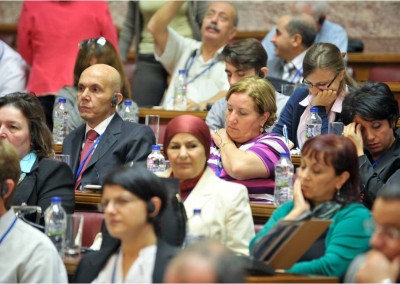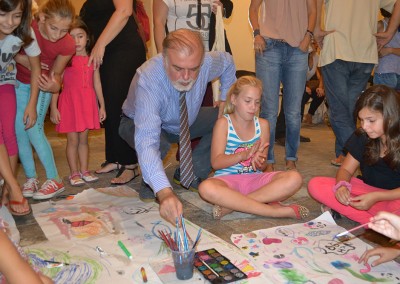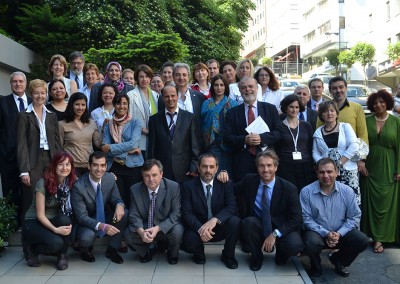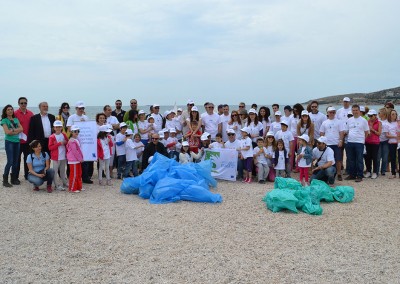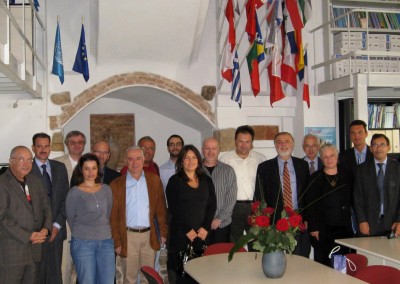A Network of Networks
MIO-ECSDE facilitates four other networks of major Mediterranean stakeholders who play a key role in addressing the region’s environmental and sustainable development challenges:
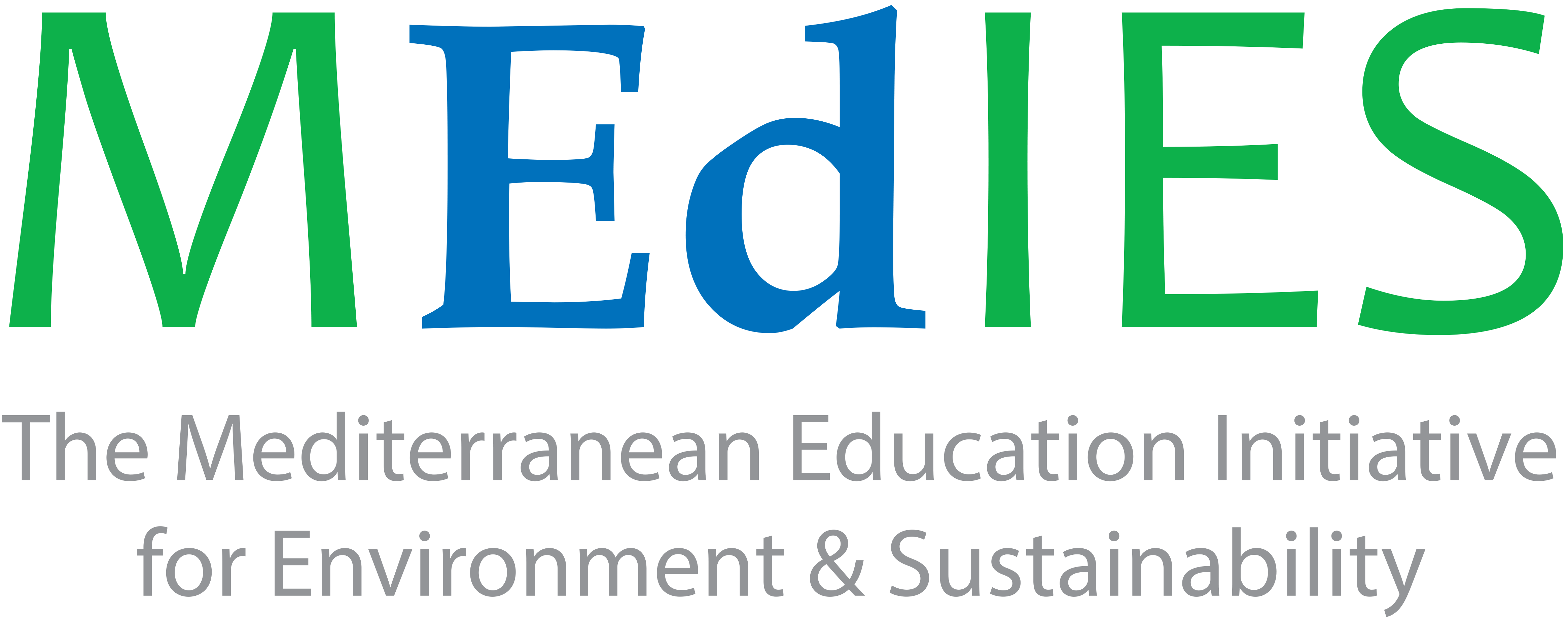 Launched in Johannesburg during the World Summit on Sustainable Development in 2002, the Mediterranean Education Initiative for Environment and Sustainability (MEdIES) aims to promote Education for Sustainable Development (ESD) and support the Mediterranean educational community by:
Launched in Johannesburg during the World Summit on Sustainable Development in 2002, the Mediterranean Education Initiative for Environment and Sustainability (MEdIES) aims to promote Education for Sustainable Development (ESD) and support the Mediterranean educational community by:
- developing educational materials for teachers and students: more than 23 publications (in more than 50,000 copies) are available in English, Arabic, French, Greek, Italian, Turkish, Croatian and Portuguese.
- building capacities: More than 45 seminars and conferences have been organized, over 700 educators trained and 6.500 students directly engaged in ESD activities (Algeria, Cyprus, Egypt, Greece, Italy, Jordan, Lebanon, Portugal, Malta, Morocco, Sweden, Syria, Tunisia)
- elaborating, campaigning for and promoting the Mediterranean Strategy for ESD
- promoting ESD through ICTs
- www.medies.net is an interactive information sharing platform of Euro-Mediterranean relevance including an on line library with MEdIES publications and an updated news area
- more than 4000 subscribed members are virtually linked (2015)
- an e-learning platform
The initiative is in line with the principles of the 2010 Conclusions of the Council of the European Union on Education for Sustainable Development (which invites Member States to take appropriate measures at the relevant level of responsibility – local, regional or national – in order to encourage the further development and implementation of ESD and its integration into the education and training system at all levels, in non-formal and informal learning just as in formal learning), the Millennium Development Goals (MDGs), the post Rio+20 priorities (including the Sustainable Development Goals – SDGs) and the UN Decade on ESD (2005-2014) and its post 2014 phase which will be decided next month in Nagoya, Japan at the UN Global Conference on ESD, and is being implemented through various innovative educational activities in the EuroMediterranean space
Furthermore, MEdIES objectives and activities directly contribute to the EU partnership with UNESCO on education, culture, science and human rights, a relatively new agreement that will boost cooperation and dialogue and will help to share information and best practice between the EU and UNESCO. It was signed between the Director-General of UNESCO, Irina Bokova, the EU High Representative for Foreign Affairs Catherine Ashton, and the former Development Commissioner, Andris Piebalgs.
The educational programmes developed by MEdIES so far are based on cross-cutting themes in the existing school-curricula of the countries. Such themes include freshwater, solid waste, resource-efficiency, consumption behavior, diet/food (biodiversity), climate change, marine litter, etc. giving emphasis on the methods applied within ESD.
ESD ultimately equips people with knowledge and skills in sustainable development, making them more competent and confident and increasing their opportunities for acting for a healthy and productive life in harmony with nature and with concern for social values, gender equity and cultural diversity.
Special emphasis is given to the role of students/learners as “messengers for sustainability” to their families and local communities. The exchange and close collaboration of EU countries and non-EU countries of the Mediterranean allows the development of a methodological framework that could be further implemented in other regions of the world.
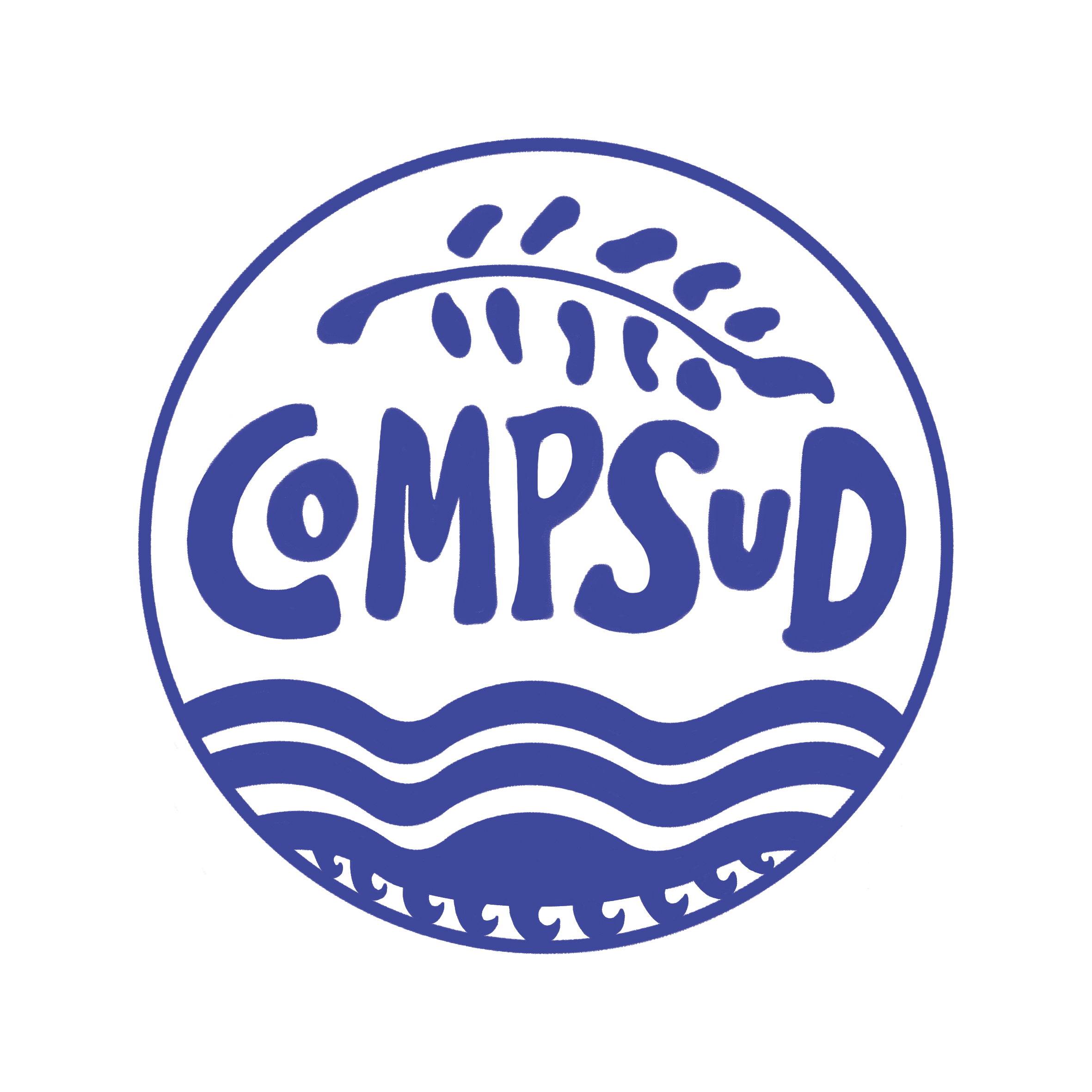 The Circle of Mediterranean Parliamentarians for Sustainable Development (COMPSUD), in 2015 numbering 93 Members of Parliament, has members from most Mediterranean countries. It was created with the encouragement of the Mediterranean Information Office for Environment, Culture and Sustainable Development (MIO-ECSDE) and the Global Water Partnership – Mediterranean (GWP-Med) in December 2002 in the wake of the Johannesburg World Summit on Sustainable Development (WSSD), which reaffirmed sustainable development as a central element of the international agenda and emphasized the important role of partnerships and dialogue among the various stakeholders and decision makers, including Parliamentarians and politicians at large.
The Circle of Mediterranean Parliamentarians for Sustainable Development (COMPSUD), in 2015 numbering 93 Members of Parliament, has members from most Mediterranean countries. It was created with the encouragement of the Mediterranean Information Office for Environment, Culture and Sustainable Development (MIO-ECSDE) and the Global Water Partnership – Mediterranean (GWP-Med) in December 2002 in the wake of the Johannesburg World Summit on Sustainable Development (WSSD), which reaffirmed sustainable development as a central element of the international agenda and emphasized the important role of partnerships and dialogue among the various stakeholders and decision makers, including Parliamentarians and politicians at large.
The Circle is an open, flexible and light structure, aiming to promote suitable mechanisms to support the dialogue among Members of Parliaments (from EU and non-EU Mediterranean countries), politicians and other Stakeholders on the protection of the Mediterranean environment and the necessary socio-economic conditions (including financial incentives and drivers of change) for the sustainable development of the region.
The Circle stresses on the necessity to strengthen effective governance of natural resources and the environment, with particular emphasis on good Water Governance and Climate Change, through the encouragement of systematic and constructive dialogues among Parliamentarians themselves and with all relevant stakeholders, civil society organizations and the public at large, as a fundamental premise for the promotion of sustainable development in conditions of peace and cooperation among all countries and peoples of the Mediterranean region.
COMPSUD has established official relations with the Parliamentary Assembly of the Union for the Mediterranean (PA-UfM), which is headed by the President of the European Parliament and particularly with its Committee on Energy, Environment and Water.
COMPSUD is intrinsically linked with the annual Regional Dialogue of Parliamentarians, Journalists, NGOs and other Stakeholders on the Protection of the Mediterranean Environment and Prospects for the Sustainable Development of the Region, organised by MIO-ECSDE. These annual Dialogues take place back-to-back with each COMPSUD meeting and produce joint statements, resolutions, plans of action, etc.
See here a background document and the COMPSUD commitment form, as well as the annual reports.
COMPSUD_Commitment (en) | COMPSUD Commitment (fr)
COMPSUD Background Document (en) | COMPSUD Background Document (fr)
COMPSUD 2 Report (en) | COMPSUD 2 Report (fr)
COMPSUD 3 Report (en) | COMPSUD 3 Report (fr)
COMPSUD 4 Report (en) | COMPSUD 4 Report (fr)
COMPSUD 7 Report (en) | COMPSUD 7 Report (fr)
COMPSUD 13 Report (Session at the European Parliament) (en)
The Circle of Mediterranean Journalists for Environment and Sustainable Development (COMJESD) was established during the “Mediterranean Regional Dialogue of Parliamentarians, NGOs and other stakeholders on the protection of the Mediterranean environment and prospects for the sustainable development of the region” (12-13 of December 2002), an event jointly organized by the Mediterranean Information Office for Environment, Culture and Sustainable Development (MIO-ECSDE) and the Global Water Partnership – Mediterranean (GWP-Med). The Circle aims to be an active forum through which the regular exchange of information and views about crucial EuroMediterranean environmental and sustainable development issues, the promotion of capacity building of media professionals and the organization of joint and concerted actions can be promoted so that information and communication experts will be strengthened in their capacity of sensitizing and informing Mediterranean societies, improving democratic and participatory processes and in directing more effectively the flow of information produced by scientists, NGOs, etc. to decision-makers, ultimately influencing policy formulation and policy implementation.
At present, the Circle is composed of 61 Journalists from the following countries: Albania, Algeria, Bosnia and Herzegovina, Croatia, Egypt, France, Greece, Israel, Italy, Jordan, Lebanon, Libya, Malta, Montenegro, Morocco, Slovenia, Spain and Tunisia. On average, 4-5 new Journalists enter the Circle every year. MIO-ECSDE keeps the members of this Circle up-dated about relevant events, facts and data through regular flow of information, mainly in electronic format.
Furthermore, COMJESD is a key vehicle for compounding the outreach of MIO-ECSDE position papers and policy briefs, activities, press releases, interviews, announcements of major developments in EU and EuroMediterranean policy, etc. They work closely not only with the Secretariat but also with the Members of the Executive Bureau of MIO-ECSDE.
MIO-ECSDE launched in November 2008 the Mediterranean Universities Network for Education for Sustainable Development (MedUnNet) in partnership with the University of Athens (UoA) to revitalize the Higher Education system towards sustainable development. The tasks of the network are:
- to provide a forum for consultation and radical re-thinking on ESD among academics, students, public administration representatives, future employers, NGOs, etc.
- the eventual development and implementation of an international Master Course on ESD.
- facilitating the “whole institute approach” on SD in each participating University which encompasses the concepts of green, resource efficient, low carbon-footprint buildings and services, along with opening up to societies and becoming platforms of sustainable innovation.
MIO-ECSDE provides the Administrative Secretariat while the UoA provides the Scientific Secretariat of the Network. The 10 partner universities come from the EU countries: Croatia, Cyprus, France, Greece, Italy, Slovenia, Spain, and the non-EU: Albania, Bosnia and Herzegovina, Egypt, Lebanon, Morocco, Tunisia and Turkey.
